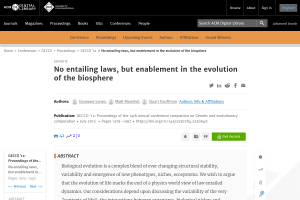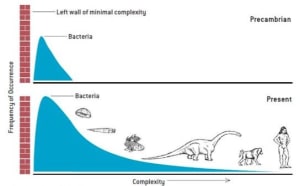
No entailing laws, but enablement in the evolution of the biosphere
Proceedings of the 14th annual conference companion on genetic and evolutionary computation
The evolution of life marks the end of a physics world view of law entailed dynamics. We discuss the notions of causation and of enablement.
Abstract
Biological evolution is a complex blend of ever changing structural stability, variability and emergence of new phe- notypes, niches, ecosystems. We wish to argue that the evo- lution of life marks the end of a physics world view of law entailed dynamics. Our considerations depend upon dis- cussing the variability of the very ”contexts of life”: the in- teractions between organisms, biological niches and ecosys- tems. These are ever changing, intrinsically indeterminate and even unprestatable: we do not know ahead of time the ”niches” which constitute the boundary conditions on selec- tion. More generally, by the mathematical unprestatability of the ”phase space” (space of possibilities), no laws of mo- tion can be formulated for evolution. We call this radical emergence, from life to life. The purpose of this paper is the integration of variation and diversity in a sound concep- tual frame and situate unpredictability at a novel theoretical level, that of the very phase space. Our argument will be carried on in close comparisons with physics and the mathematical constructions of phase spaces in that discipline. The role of (theoretical) symmetries as invariant preserving transformations will allow us to under- stand the nature of physical phase spaces and to stress the differences required for a sound biological theoretizing. In this frame, we discuss the novel notion of ”enablement”. Life lives in a web of enablement and radical emergence. This will restrict causal analyses to differential cases (a difference that causes a difference). Mutations or other causal differ- ences will allow us to stress that ”non conservation princi- ples” are at the core of evolution, in contrast to physical dynamics, largely based on conservation principles as sym- metries. Critical transitions, the main locus of symmetry changes in physics, will be discussed, and lead to ”extended criticality” as a conceptual frame for a better understanding of the living state of matter.
Keywords: conservation properties, symmetries, biological causality



